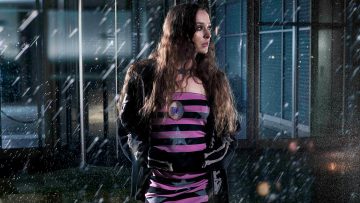

Summer is un-cancel-able. While festivals, clubs and gigs might still be out the window, with lockdown easing and longer days, there’s more opportunity for us to get together, stay out late, and (in the words of fashionista Tim Gunn) make it work.
Summer wouldn’t be summer without those painless puzzles called pop songs, which go hand-in-hand with communal experience. So while summer 2020 might be a compromised and compromising one, how might music bring us together, make us feel lighter and punctuate these sunny days?
Summer 2020 might be a compromised and compromising one, but how might music make us feel lighter and punctuate these sunny days?
‘To everything there is a season,’ sang The Byrds in 1959 (lifting lyrics from the Bible) and summer is the season to get songs lodged in your head. Pandemic or not.This summer, the song stuck in my head is ‘Flowers (Sunship Remix)’ (2000) by Sweet Female Attitude, thanks to two flower-crowned teenagers blasting it from a speaker as they walked with self-conscious swag through Primrose Hill on the summer solstice.
Nothing can salvage a mood like music, and that’s just what ‘Flowers’ does in Michaela Coel’s new drama I May Destroy You (2020); it’s one of those garage anthems that brings everyone back to the dance floor just as the night is threatening to end.

Its lyrics are pleasingly vague, sentimental, inauthentic: ‘I’ll bring you flowers, I’ll make your day / The tears you cry, I’ll dry them all the way away’. Yet, combined with the shuffling drum beat and hot-potato backing vocals, lifting someone’s mood has never been so easy.
Sweet Female Attitude’s song uses the same chord sequence as Erik Satie’s Trois gymnopédies (1888) (The House & Garage Orchestra blend the two together to brilliant effect). Satie’s pieces are dreamy, drifting through repeated floating structures: the opposite of dance-floor fillers – yet they’re named after just that.
Combined with the shuffling drum beat and hot-potato backing vocals, lifting someone’s mood has never been so easy
The Gymnopaedia was an annual celebration in ancient Sparta, during which naked youths showed off their athletic and martial skills through the medium of war dancing. Satie’s esoteric title has puzzled critics for decades.
I believe he chose it to take the weight off. Unrestricted by conventional terms (sonatas, préludes, etc.) Satie invented himself a profession. “I am a gymnopedist,” he said.

Satie’s friend, J.P. Contamine de Latour, uses the word in the poem ‘Les Antiques’ (‘The Ancients’) (1888):
Cutting sidelong through the shadows, a brilliant torrent,
Flowing in waves of gold over the polished flagstone,
Where the atoms of amber shimmering in the fire
Mixed their sarabande with the gymnopaedia.
Present participles (-ings) sweep us through the lines and through images suspended as a broken chord: a stream flows into ‘gold’, turns to ‘amber’, turns to ‘fire’, in a deepening of colour and a narrowing of scale.
The suggestion is that human connection is a kind of alchemy that connects modern communal experiences with ancient ones
We culminate in a blend of two dances, the stately Spanish ‘sarabande’ and the gymnopaedia. The suggestion is that human connection is a kind of alchemy that connects modern communal experiences with ancient ones.
The suggestion is that when Glastonbury gets cancelled we can flicker from flower-crowns to the petals raining down in Sweet Female Attitude’s music video and falling on the dusty floor of a Spartan amphitheatre.

Latour’s poem, like Satie’s music, affords an experience of weightlessness, and ‘Weightless’ (2012) is the name of the world’s most relaxing song – or at least a song so tranquilising it’s considered dangerous to listen to while driving.
The eight-minute track, composed by Marconi Union in collaboration with sound therapists, is filled with mellow synths, low tones that produce a trance-like state, and manipulated field recordings of natural landscapes.
Latour’s poem, like Satie’s music, affords an experience of weightlessness
US researchers tested the piece of music on patients experiencing pre-surgery anxiety. They found that patients who listened to ‘Weightless’ had a similar level of anxiety reduction prior to being given a nerve block anaesthetic as the group who took a sedative called Midazolam.
Despite this hard scientific evidence, I don’t mean to imply that I think all music is medicine; rather, the idea that it can be a kind of drug is what makes it so intoxicating. I’m saying that when Eddie Cochran sings, ‘there ain’t no cure for the summertime blues’, I respectfully disagree.
With that in mind, I started a playlist, asked friends for their suggestions of ‘Songs to Salvage the Summer’. Above is a link to the result, a collective effort, mixing sarabandes with gymnopedies, joining the summer we might have desired with the one we actually have.




